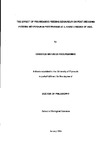THE EFFECT OF PRE-WEANING FEEDING BEHAVIOUR ON POST-WEANING FEEDING BEHAVIOUR IN PIGS WEANED AT 3, 4 AND 5 WEEKS OF AGE
| dc.contributor.author | TSOURGIANNIS, CHRISTOS ANTONIOS | |
| dc.contributor.other | Faculty of Science and Engineering | en_US |
| dc.date.accessioned | 2013-10-22T10:03:22Z | |
| dc.date.available | 2013-10-22T10:03:22Z | |
| dc.date.issued | 2006 | |
| dc.identifier | NOT AVAILABLE | en_US |
| dc.identifier.uri | http://hdl.handle.net/10026.1/2276 | |
| dc.description.abstract |
A program of study was undertaken to asses the effect of pre-weaning feeding behaviour on post-weaning feeding behaviour in pigs weaned at various ages (3, 4 and 5 weeks of age) and to identify ways of increasing their post-weaning feed intake. The studies were constructed using time extensive continuous recording methods in order to monitor the 'true' behaviour unbiased by sampling errors. Piglets weaned at 3 weeks of age had the ability to grow faster and became significantly heavier at six weeks of age (3W: 12.S06 ± 0.629 kg) than piglets that had to extent their stay for one (4W: 10.S14 ± 0.693 kg) or two more weeks (SW: 10.987 ± 0.376 kg) with the sow. In addition, 4W piglets had the greatest difficulty adapting to their new environment in comparison to 3W and SW piglets, as they had greater scores on aggressive and abnormal behaviour during the week post-weaning. This study demonstrated that the provision of a familiar feeder post-weaning i) allowed all 4W piglets, irrespective of their pre-weaning feeding experiences, to allocate the feeding resources unaided and autonomously without having to rely on the feeding temperament of their more experienced littermates or having to imitate them eating, ii) helped the less experienced piglets of the litter (regarding their feeding behaviour) to build a stronger immune system and to become heavier at the end of the first week and iii) improved the welfare of the piglets soon after weaning as they were performing significantly less belly-nosing in contrast to equivalent piglets that were not suited with a familiar feeder. Also, extensive pre-weaning feeding behaviour can help 4W piglets obtain a stronger immune system by the end of lactation independent of their weight and their teat order. The study reported in this thesis provides good evidence that choosing to use a time-period which was previously applied by other researchers could lead most of the times to incorrect conclusions. Also, short time-sampling strategies have been proven to be insufficient to provide strong or valid statistical associations with the 'true' duration of the behaviours under investigation (r<70%). Continuous weekly recordings during the day hours (8:00 to 17:00h) were shown to be sufficient to provide measurements of strong association with the 'true' duration of the behaviours for the given week. | en_US |
| dc.language.iso | en | en_US |
| dc.publisher | University of Plymouth | en_US |
| dc.title | THE EFFECT OF PRE-WEANING FEEDING BEHAVIOUR ON POST-WEANING FEEDING BEHAVIOUR IN PIGS WEANED AT 3, 4 AND 5 WEEKS OF AGE | en_US |
| dc.type | Thesis | |
| dc.identifier.doi | http://dx.doi.org/10.24382/3995 |
Files in this item
This item appears in the following Collection(s)
-
01 Research Theses Main Collection
Research Theses Main


